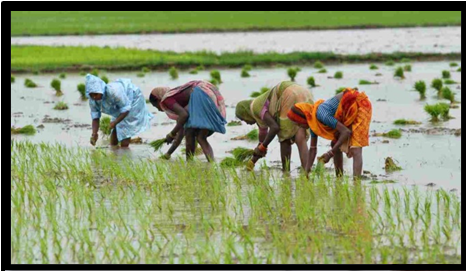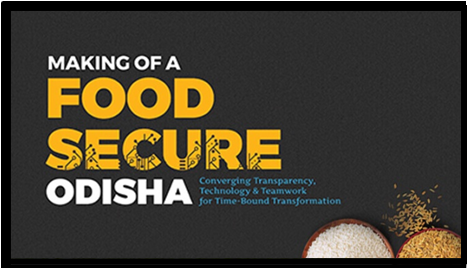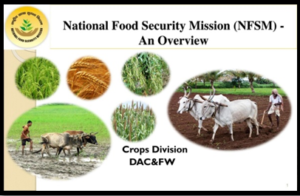HARVEST THE ODISHA STORY TO ENSURE FOOD SECURITY
Relevance:
GS 2
- Issues relating to poverty and hunger.
- Welfare schemes for vulnerable sections of the population by the Centre and States.
Why in News:
Odisha’s transformational journey is increasingly being cited as a model and a source of ideas for creating food security that is built around equity and sustainability.
Source- Money Control
In the face of escalating climate crises and their detrimental impact on global food security, Odisha’s paradigmatic transformation stands as a beacon of hope. Through a multifaceted approach encompassing agricultural innovation, climate resilience, and social protection, Odisha’s journey offers invaluable lessons for fostering sustainable food security models amid daunting climate challenges.
Setting the Stage: COP28 and the Climate Crisis
- Current Scenario: COP28 in Dubai highlights the worsening impact of climate change on the planet’s future.
- Projections: Disasters increasing to 560 per year, daily hunger and malnutrition rising by 20%, and a 21% decline in food productivity due to global warming.
Odisha’s Transformative Journey:
Agricultural Transformation
- Odisha shifted from rice importing to a record-breaking food grain production of 13.606 million tonnes in 2022.
- Notable aspects: Majority small/marginal farmers and a remarkable increase in productivity despite stable crop areas.
- Productivity Surge: Tripling of rice yield in two decades.
- Kalahandi district’s turnaround from the “land of hunger” to Odisha’s rice bowl.
Climate-Proofing Agriculture
- Unique model achieving SDG 2 (Zero Hunger) by focusing on small farmers’ income increase.
- Flagship schemes like KALIA and Odisha Millet Mission bolster crop diversification and climate resilience.
- Focus Areas: Small farmer empowerment, income rise, and resilient livelihoods.
Resilience and Sustainability
- Proactive approach through a comprehensive Climate Change Action Plan across various sectors.
- Bottom-up resilience development with community involvement and field-level monitoring.
- Adoption of climate-resilient cultivation practices, technological interventions, and farmer training.
Social Protection
- Odisha’s surplus paddy production contributes significantly to India’s food pool.
- Collaboration with UN World Food Programme leads to innovative food security
Impact and Future Implications
- Agricultural Excellence: From importing rice to record-breaking food grain production, Odisha showcases remarkable agricultural advancement.
- Empowered Farmers: Initiatives like KALIA have uplifted smallholders, boosting incomes and securing local food sources.
- Climate-Ready Practices: Diversification and innovative farming methods fortify Odisha’s agriculture against climate adversities.
- Community-Centric Approach: Engaging locals in resilient strategies minimizes the impact of severe weather patterns.
- Tech-Driven Solutions: Collaborations foster technological innovations, ensuring fortified food schemes and enhanced security for vulnerable groups.
- Holistic Climate Plan: Odisha’s comprehensive action plan sets a blueprint for sustainable practices across sectors, aiding regions facing similar challenges.
From Deficit to Surplus:
Source- CSM Technology
- Odisha transformed into the fourth-largest contributor to national paddy reserves, leveraging ‘Crop Analytics’ in 29 districts for direct farmer procurement.
- Tech-Powered Transparency: ‘Crop Analytics’ integrates satellite imaging, analytics, and visualization, ensuring transparency, accountable supply chains, and targeted food allocation without leakages.
- National Food Security Act Implementation: Odisha’s automation in Fair Price shops under the Act minimized manipulation, boosting authenticated transactions and ensuring benefits reach genuine beneficiaries.
- Technology Reinforcements: Embracing blockchain, analytics, and ERP, Odisha fortifies food security via efficient inventory management, curbing diversion, and wastage.
- Future Steps: Odisha, committed to UN-defined food security, plans digital beneficiary authentication, cost-effective transportation, and an expanded network of registered farmers.
- Tech-Driven Governance: Naveen Patnaik’s government aims to enhance governance through technology, specifically mentioning ‘Crop Analytics’ as a catalyst for Agriculture 4.0 and result-oriented policy interventions.
Way Forward
- Replication and Adaptation: States can emulate Odisha’s model, customizing approaches to suit local contexts, promoting sustainable agriculture and climate resilience.
- Investment in Technology: Embrace digital solutions, advanced farming techniques, and innovation to enhance productivity while mitigating climate risks.
- Community Engagement: Foster partnerships between communities, governments, and organizations, ensuring local participation in climate-resilient agricultural practices.
- Policy Integration: Integrate climate resilience into policy frameworks across sectors, emphasizing adaptation strategies in agriculture and food security planning.
- Knowledge Sharing: Facilitate knowledge exchange platforms, enabling states to learn from Odisha’s experiences, best practices, and innovative initiatives for sustainable food systems.
Odisha’s transformative strides in agriculture, climate resilience, and social protection offer a beacon of hope amid global climate challenges, presenting a robust blueprint for fostering food security, sustainability, and resilience worldwide.
Government Schemes
National Food Security Act (NFSA): · Enacted in 2013, NFSA ensures affordable food grain entitlements for eligible beneficiaries, guaranteeing specified quantities at reasonable prices. Integrated Child Development Services (ICDS): · Initiated in 1975, ICDS stands as India’s flagship early childhood care and development program, recognized as one of the world’s largest and most innovative. Public Distribution System: · Focused on distributing FCI-procured food among the disadvantaged sections of society, ensuring access to essential sustenance. Antyodaya Anna Yojana (AAY): · Launched in 2000, it identifies the poorest BPL families for targeted public distribution, aiding those most in need through state-led surveys. POSHAN Abhiyan: · Targets malnutrition by providing supplementary nutrition, especially to pregnant women and children under six.
|
Source
The Hindu
Mains Question
Q “How has Odisha’s agricultural transformation and climate resilience model contributed to addressing global food security challenges amidst escalating climate crises?”



 Source: Sahakari schemes
Source: Sahakari schemes

